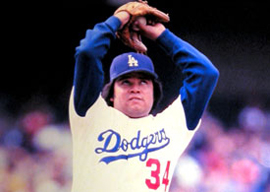
April 13, 2011

Fernando Valenzuela
Third: Blame discrimination. Prejudice is the only admissible explanation for why Mexicans don”t get their fair share of superstardom. Yet Fernandomania happened. It wasn”t even unplanned. The Dodgers” late owner Walter O”Malley had long searched for “a Mexican Sandy Koufax,” an East LA counterpart to the superb Brooklyn-born southpaw who electrified West LA’s huge Jewish community by averaging over 24 wins per season in 1963-1966. (Dodger scouts subsequently canvassed Mexico for decades looking in vain for the second coming of Fernando.) Further, everybody in 1981 loved Fernando. Attendance at Dodger road games averaged nine thousand higher when Valenzuela pitched, even in cities with a negligible Latino presence.
Fourth: Attribute the lack of Mexican superstars to insufficient role models. This popular rationalization is a variation on Zeno’s paradoxes, those ancient reductiones ad absurdum. Just as Achilles can never catch the tortoise, how can a Mexican-American become, say, a tennis superstar without a Mexican role model? Yet Pancho Gonzales, an ex-juvenile delinquent from East LA, was perhaps America’s most famous tennis player from the late 1940s to the early 70s. Similarly, Nancy Lopez became the most popular woman golfer ever (as measured in consumer packaged-goods endorsements) by winning five straight tournaments as a 21-year-old rookie in 1978.
In the 1970s, Lee Trevino ranked right behind Arnold Palmer and Jack Nicklaus in golf fame. In retelling, his career sounds like a mash-up of a half-dozen implausible made-for-TV movies. At age five, Trevino missed school to pick cotton. He dropped out at 14 to caddy, joined the Marines, and then became a driving-range pro and golf hustler. He”d take your money using just a shovel and a Dr. Pepper bottle for a club.
Blessed and cursed with a standup comic’s personality, the Merry Mexican privately battled the comedian’s demon of depression. Then, at the 1975 Western Open, Trevino was struck by lightning. He laboriously overcame spinal injuries to finally win another major championship in 1984 at age 44. Instead of being made into a movie, Trevino’s career is now mostly as obscure as the reasons Mexican-Americans have faded in the struggle for fame.
But at his peak Lee Trevino was “Supermex,” defeating the mighty Nicklaus in major championships while cracking nonstop jokes with his adoring gallery, Lee’s Fleas: “You can call me a Spaniard now, because who ever heard of a rich Mexican?”